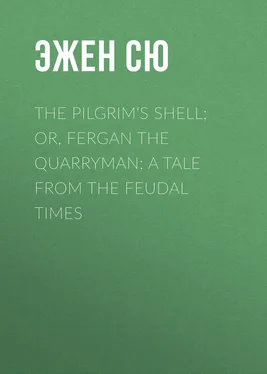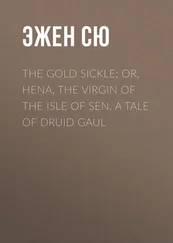Эжен Сю - The Pilgrim's Shell; Or, Fergan the Quarryman - A Tale from the Feudal Times
Здесь есть возможность читать онлайн «Эжен Сю - The Pilgrim's Shell; Or, Fergan the Quarryman - A Tale from the Feudal Times» — ознакомительный отрывок электронной книги совершенно бесплатно, а после прочтения отрывка купить полную версию. В некоторых случаях можно слушать аудио, скачать через торрент в формате fb2 и присутствует краткое содержание. Издательство: Иностранный паблик, Жанр: literature_19, foreign_antique, foreign_prose, на английском языке. Описание произведения, (предисловие) а так же отзывы посетителей доступны на портале библиотеки ЛибКат.
- Название:The Pilgrim's Shell; Or, Fergan the Quarryman: A Tale from the Feudal Times
- Автор:
- Издательство:Иностранный паблик
- Жанр:
- Год:неизвестен
- ISBN:нет данных
- Рейтинг книги:3 / 5. Голосов: 1
-
Избранное:Добавить в избранное
- Отзывы:
-
Ваша оценка:
- 60
- 1
- 2
- 3
- 4
- 5
The Pilgrim's Shell; Or, Fergan the Quarryman: A Tale from the Feudal Times: краткое содержание, описание и аннотация
Предлагаем к чтению аннотацию, описание, краткое содержание или предисловие (зависит от того, что написал сам автор книги «The Pilgrim's Shell; Or, Fergan the Quarryman: A Tale from the Feudal Times»). Если вы не нашли необходимую информацию о книге — напишите в комментариях, мы постараемся отыскать её.
The Pilgrim's Shell; Or, Fergan the Quarryman: A Tale from the Feudal Times — читать онлайн ознакомительный отрывок
Ниже представлен текст книги, разбитый по страницам. Система сохранения места последней прочитанной страницы, позволяет с удобством читать онлайн бесплатно книгу «The Pilgrim's Shell; Or, Fergan the Quarryman: A Tale from the Feudal Times», без необходимости каждый раз заново искать на чём Вы остановились. Поставьте закладку, и сможете в любой момент перейти на страницу, на которой закончили чтение.
Интервал:
Закладка:
"This worthy man is right," said several voices. "Let's follow his advice."
"Dear brothers, look out what you do!" cried Simon the monk. "The seigneur of Plouernel is a monster of ferocity. He is given up to sorcery with a female magician, his concubine … a Jewess! He stands excommunicated; he is a pagan."
"To the devil with the Jews!" exclaimed Harold the Norman, merchant of relics. "The Jews have all been hanged, burned, drowned, strangled, quartered, when they were hunted down in all the provinces, like wild beasts. There can not be one of them left alive in our land of Gaul."
"Since the execution of the Orleans heretics, who perished by fire," resumed the monk Jeronimo, "never was an extermination of unclean animals more meritorious than that of those accursed Jews, who instigated the Saracens of Palestine to destroy the Temple of Solomon at Jerusalem. Death to the Jews!"
"What say you, dear brother?" inquired a townsman. "Did the Jews of this land of Gaul instigate the destruction of the Temple of Jerusalem?"
"Yes, my brother. The abominable mischiefs of those Jews defy time and space. But patience! Soon will the day come when, by divine will, no longer will it be isolated pilgrims that will travel to Jerusalem to there mourn and pray at the tomb of our Lord Jesus Christ. It will be Christianity in mass that will march under arms to the Holy Land, in order to exterminate the infidels and deliver the sepulchre of the Saviour of the world from their sacrilegious presence. Death to all miscreants!"
Bezenecq the Rich, who had just approached the group of debating travelers, and ascertained the subject of their discussion, apprehensive lest his daughter take new alarm, suggested: "Meseems we had better take the shorter route. As to your fears, they are exaggerated. When we shall have paid the toll-collectors of the seigneur of Plouernel for the right to travel over his roads and cross his burgs and villages, what else can he demand of us? We are neither his serfs nor his villeins.'
"Can you, a grey beard, talk like that?" interjected Simon the monk. "Do you imagine these devilish seigneurs care aught for justice or injustice?"
"But I do care a deal about that!" replied Bezenecq the Rich. "If the seigneur of Plouernel should do me violence, me a bourgeois of Nantes, I would appeal to William IX, Duke of Aquitaine, of whom the seigneur of Plouernel stands seized, the same as William IX holds of Philip I, King of the Franks. Each of these seigneurs has his suzerain."
"Which would be like appealing from the wolf to the tiger," replied Simon, shrugging his shoulders. "You can not know William, Duke of Aquitaine. That sacrilegious criminal sought to force Peter, the Bishop of Poitiers, to give him absolution for his crimes by putting a dagger to his throat. William abducted Malborgiane, the wife of the Viscount of Castellerault, a shameless creature, whose picture he dares to carry painted on his shield. William had the effrontery to answer Gerard, the Bishop of Angouleme, who reproached him with this new act of adultery: 'Bishop, I shall return Malborgiane when you frizzle your hair!' The prelate was bald. Such is the man to whom you would appeal from the violent acts of the seigneur of Plouernel."
"That William is certainly a deep-dyed criminal;" put in Jeronimo, "but that much justice must be done him that he approved himself the most implacable exterminator of the Jews. Not one of those who lived on his domains escaped death!"
"It is said that the mere sight of a Jew makes him pale with horror; and that, libertine though he is, a Jewess, be she never such a beauty, be she a maid like the Virgin Mary, would make him run away from her."
"But that does not prevent," insisted Simon the monk, "that if you rely upon the Duke of Aquitaine for redress against the seigneur of Plouernel, you will be acting like a lunatic. On that subject your judgment is at fault."
"If William IX does not do us justice," rejoined Bezenecq the Rich, "we shall appeal to King Philip. Oh! oh! we townsmen do not allow ourselves to be tyrannized without protest! We know how to draw up a petition!"
"And what will King Philip care for your petition? That Sardanapalus! that glutton! that idler! that double adulterer! and what's worse, that dullard, whom the seigneurs, his large vassals, laugh at openly! It is to him you will go for justice, if refused by the Duke of Aquitaine? Moreover, even if the latter were so inclined, as the suzerain of the seigneur of Plouernel, to punish him for wrongs done to you, would he have the power?"
"Certainly!" exclaimed Bezenecq. "He would enter the domain of the seigneur of Plouernel and besiege him in his castle."
Simon the monk shook his head sadly. "The seigneurs reserve their forces to round up their domains and to revenge their own wrongs. Never do they protect the cause of small folks, however just it be."
"We live, I know, in sad times; nor were the previous centuries much better," observed the townsman with a sigh, casting an uneasy look upon his daughter, who seemed again alarmed. "All the same, we should not exaggerate to ourselves the dangers of the situation. We have to choose between the two routes. Let's suppose the dangers of crossing them are equal. Common sense bids us to take the shorter, and that we hurry our steps."
"The shorter route is the more perilous," repeated Simon the monk, who, more than anyone else, seemed to dread crossing the territory of the seigneur of Plouernel.
"Oh! father," asked Isoline of the merchant, "have we really so many dangers to fear?"
"No, no, my dear child. That poor monk's mind is upset with fear."
The Norman dealer in relics, having overheard the last words of Isoline, approached her and said with much unction: "Pretty lassie, I have here in my box of relics a superb tooth, that comes from the blessed jaw of a holy man, who died in Jerusalem, a martyr to the Saracens. I shall let you have that tooth for three silver deniers. This sacred relic will protect you from all perils of the road." Saying which, Harold the Norman was about to exhibit the marvellous tooth, when Bezenecq said smiling to him, so as to reassure his daughter; "Not now, my friend; we shall look at your relic later on. Do you claim that it protects one against all the dangers of the road?"
"Yes, worshipful townsman. I swear it upon my eternal salvation; upon my share of Paradise."
"Seeing that you carry about you that holy relic, you will not be exposed to any accident; and seeing that we go with you, and are of your company, we shall profit by the miraculous protection. All of which should not hinder us, if you follow my advice, dear companions, to take the shorter route. Let those who share my views follow me," he added giving the spurs to his mule so as to put an end to the discussion, and with that he took the road that led over the territory of the seigneur of Plouernel. The majority of the travelers followed the example of Bezenecq, because, for one thing, he spoke wisely; then also, he was known to be rich, his daughter accompanied him, and he had too much at stake to take an imprudent resolution. Those who shared the apprehensions of the monk Simon, being reduced to a small number, dared not separate from the bulk of the troop, and joined it after a moment's hesitation. Likewise Simon the monk and Jeronimo, who feared risking themselves alone on the other road. Harold the Norman remained behind an instant, drew near one of the gibbets, pulled off the two legs and hands of a corpse, that was reduced to a mere skeleton, and placed them in his bag, counting upon selling them to the faithful for holy relics. He then rejoined the travelers, who were proceeding along the road of the seigniory of Plouernel.
CHAPTER IV.
THE MANOR OF PLOUERNEL
The castle of Neroweg VI – a somber retreat, situated, like the eyrie of a bird of prey, on the brow of a steep mountain – dominated the country for many miles around. The moment the watchman, posted on the platform of the donjon, espied from afar a troop of travelers, he sounded his horn. Immediately the band of the count, thievish and ferocious, would sally from the manor. These bandits, not satisfied with demanding the dues of passage and traffic, habitually pillaged the travelers, often even massacred them, or took them to the castle to be tortured and compelled to pay ransom. The face of Gaul bristled with similar haunts, raised by the Frankish seigneurs under the reign of Charles the Great. They were impregnable fortresses, from the heights of which barons, counts, marquises and dukes defied the royal authority, and desolated the country. The history of the Count of Plouernel is that of all these seigneurs who issued from the race of the first conquerors of Gaul. In the year 818, a Neroweg, second son of the head of this Frankish family that had been richly endowed in Auvergne since Clovis, was one of the chieftains in the army of Louis the Pious, when he ravaged Brittany, then in revolt at the call of Morvan and Vortigern. That Neroweg, in reward for his services during that war, received from the King a fief of the lands and county of Plouernel, which had reverted to the crown by the death of its last beneficiary, who left no heirs. Neroweg, in return for the cession of the county of Plouernel, was to own himself a vassal of Louis the Pious, render him fealty and homage as to his king and suzerain seigneur, pay him tribute, and support him in his wars by marching at the head of the men of his seigniory. In the country of Plouernel, as in the other provinces of Gaul, certain colonists named villeins had succeeded in emancipating themselves and again became owners of parcels of land. Neroweg I. (the first of the name of this second branch of the family) did not revolt against the authority of the King. His son, however, Neroweg II., had a strong castle built on the summit of the mountain of Plouernel, assembled there a numerous band of determined men, and then, with most of the other seigneurs, he said to the King of the Franks: "I do not recognize your sovereignty; I will no longer be your vassal; I declare myself sovereign on my domain, like you are on yours. The serfs, villeins and townsmen of my county become my men; they, their lands, their property belong to me only; I shall tax them at my will and impose upon them tributes, rent and taille which they shall pay to me only; they will go to war for me alone, and against you, should you dare come and besiege me in my fortress of Plouernel." The King did not go, seeing that most of the seigneurs held the same language to the descendants of Charles the Great or of Hugh le Capet, whose kingdom was gradually reduced to the possession of the bare provinces that he was able to defend and preserve, arms in hand. Neroweg III. and Neroweg IV. did as their ancestor and remained independent, masters, absolute and hereditary, of the country of Plouernel. A large number of Frankish seigneurs seized in the same way other parts of the territory of Gaul. Robert thus became Count of (the country of) Paris; Milo, Count of (the country of) Tonnerre; Hugh, Count of (the country of) Maine; Burcharth, Sire of (the country of) Montmorency; Landry, Duke of (the country of) Nevers; Radulf, Count of (the country of) Beaugency; Enghilbert, Count of (the country of) Ponthieu; etc. These and a number of other seigneurs, descendants of the leudes of Clovis or of the chieftains of the bands of Charles Martel, dropping their Frankish names, or joining to them the Gaulish names of the regions that they took possession of, had themselves called "seigneurs," "sires," "dukes" or "counts," of Paris, of Plouernel, of Montmorency, of Nevers, of Tonnerre, of Ponthieu, etc., etc. During those centuries of wars and brigandage the Nerowegs had fortified their castle, while they lived on rapine and on the extortion of their villeins and their serfs. Neroweg V., surnamed "Towhead," from the color of his hair, and Neroweg VI., surnamed "Worse Than a Wolf" by the wretched people of his domains on account of his cruelty, proved themselves worthy of their ancestors.
Читать дальшеИнтервал:
Закладка:
Похожие книги на «The Pilgrim's Shell; Or, Fergan the Quarryman: A Tale from the Feudal Times»
Представляем Вашему вниманию похожие книги на «The Pilgrim's Shell; Or, Fergan the Quarryman: A Tale from the Feudal Times» списком для выбора. Мы отобрали схожую по названию и смыслу литературу в надежде предоставить читателям больше вариантов отыскать новые, интересные, ещё непрочитанные произведения.
Обсуждение, отзывы о книге «The Pilgrim's Shell; Or, Fergan the Quarryman: A Tale from the Feudal Times» и просто собственные мнения читателей. Оставьте ваши комментарии, напишите, что Вы думаете о произведении, его смысле или главных героях. Укажите что конкретно понравилось, а что нет, и почему Вы так считаете.












